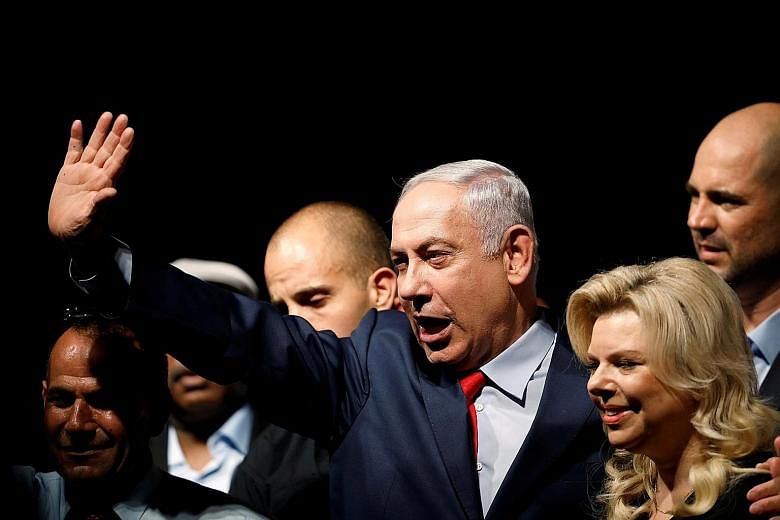The air raid sirens began to howl, and the reporter tried to stop the live interview to seek shelter. His interviewee, however, just put on a gas mask calmly and went on talking.
It was the first Gulf War in 1991. Iraqi missiles rained down on Tel Aviv. But Israel's Deputy Foreign Minister turned rockets into props, and the CNN-interview into a typical Benjamin Netanyahu moment. The then 41-year-old backbench politician became an instant star.
A quarter of a century later, with Mr Netanyahu serving more than a decade as his country's prime minister, even his harshest adversaries acknowledge that "Bibi", as supporters and detractors call him, is a media wizard, who gets himself re-elected no matter what.
Be it a gas mask or a red line drawn on a chart before the UN General Assembly, hardly any other politician can match his media savviness and tactical cunning. But these may not be enough for him to get out of his newest entanglement. Several police investigations threaten to bring him and his entourage down for good.
On Nov 19, the police spent four hours in the Prime Minister's official residence in Jerusalem for Mr Netanyahu's sixth interrogation. This time, investigators concentrated on "case 1,000". In this affair, which seems to be one with the hardest evidence, Mr Netanyahu admits receiving personal gifts from billionaires for over a decade. But he contends that the champagne, cigars and other "favours" he received were part of a normal friendship, did not amount to large sums of money and did not motivate him to advance their business interests.
The police, however, regard them as illicit handouts whose total worth could well exceed US$150,000 (S$202,000). A personal assistant has apparently told police that Mr Netanyahu's wife would call her up regularly to ask for cigars and champagne, using code words for each item - suggesting she was well aware of the illegal nature of her request. Israeli law forbids officials from receiving gifts and does not require the proof of a trade-off to constitute corruption. But even that seems proven in Mr Netanyahu's case. In one instance, the billionaire admitted repeatedly asking then US Secretary of State John Kerry to help film producer Arnon Milchan get a long-term visa in the United States.
In "case 2,000", Mr Netanyahu tried to cut a deal with a newspaper publisher extremely critical of him. The Premier offered to reduce the competitor's circulation if the publisher reined in his journalists.
And in "case 3,000", Mr Netanyahu's close aides face charges of accepting bribes to push through an arms deal with Germany worth billions. According to Israeli media, police may recommend indicting Mr Netanyahu within a month or two. The law does not require him to resign in that case, but public and political pressure would probably force him to step down and initiate new elections.
All these suspicions seem a far cry from what Bibi once embodied: In the 1970s, he was a "talented and diligent student", as his MIT mentor recounted.
He went to the US after serving as an officer in Israel's most elite army commando unit. Mr Netanyahu got his BA in architecture in only 21/2 years by doubling his course load, then finished his MBA.
He worked in the US until a phone call, telling him his beloved elder brother Yoni had been killed in a rescue operation in Entebbe, Uganda, changed his life. Mr Netanyahu returned home to dedicate his life to fighting terror - to the present day. He entered the Likud party, which was bitterly opposed to any territorial compromise with the Palestinians.
Mr Netanyahu, who personified a new crop of sleek and clean politicians, climbed its ranks quickly to reach its helm. The scion of a distinguished upper-middle class family became the unlikely champion of Israel's disenchanted Misrahim - Jewish immigrants from Arab countries who have less access to education, wealth and health services.
As leader of the opposition, "King Bibi" showed an unrelenting thirst for political power, not even shying away from dubious coalitions. He attacked then Prime Minister Yitzhak Rabin's compromises with the Palestinians. When Mr Rabin was assassinated on Nov 4, 1995, Mr Netanyahu's bid for the highest office finally succeeded. Likud won the election in 1996 and Mr Netanyahu became Israel's youngest leader at 46. But his first stint as prime minister was short.
In the 1990s, Israelis held out hope for peace, and his pessimistic rants of existential dangers did not sit well. But when the second Intifada replaced peace talks with undiscriminating terror attacks, Mr Netanyahu returned as the man who had "told you so". He filled several senior government posts, until he became prime minister three times consecutively from 2009.
His rhetorical skills and tactics to stay in power increasingly served to divide his own people. In the international sphere, he has alienated many of Israel's allies in Europe. He even made enemies in the Democratic Party in the US, a key ally.
Suspicion of corruption and an extravagant lifestyle at the taxpayers' expense have always haunted him. Mr Netanyahu insists that "nothing will come of this since nothing ever happened". But this time it seems as if investigators are unimpressed with his catchy soundbites.

